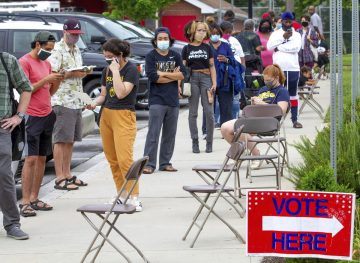by Scott F. Aikin and Robert B. Talisse

Democracy is the ideal of a self-governing society of equals. An immediate upshot of political equality is political disagreement. Among equals, no one get simply to dictate what others must believe about politics. As equal citizens, each gets to exercise their own political judgment, for better or worse. Democracy hence is the proposition that we can live together as self-governing equals despite ongoing political disagreement.
Democracy is a dignifying proposal. But it’s no picnic. Democracy is rooted in a handful of hard truths that responsible citizens need to keep in mind.
First is that you can’t always get what you want. In fact, you often can’t avoid getting what you don’t want. Knowing the truth about what justice requires or which candidate is best does not entitle you to get your way. Nor does your ability to refute your opponents. Thus, a harder political truth: in a democracy, you can’t always get what you know is right.
That’s not all. When your side loses at the polls, it would be illegitimate for democratic government to enact your will. For electoral losers the principal consolation is that there’ll be another election, and thus another chance to get fellow citizens to see the light. This means that in the wake of defeat, those who care about justice must redouble their effort. Another hard truth: knowing what’s right in politics makes for more work, not less.
Even when justice prevails, you still can’t have it all. Your political rivals retain their status as equal citizens even when they’re demonstrably in the wrong. Losing at the polls does not mean that they must acquiesce. They remain entitled to object, criticize, resist, complain, and campaign on behalf of what you regard as injustice. Moreover, democratic government is required not merely to allow electoral losers to continue pressing their opposition. It must provide them a platform for their advocacy, even when they’re in the wrong. Thus, the hardest truth: democracy empowers justice and injustice alike.
We might resign ourselves to these hard truths by adopting Winston Churchill’s view that, whatever its flaws, democracy is best given the alternatives. But seeing democracy like this sells it short. It abandons the idea of self-government among equals and embraces the idea of democracy as a cold civil war. The trouble is that once we see democracy as a cold civil war, we might ask ourselves why we shouldn’t turn up the heat. That’s the problem with cold civil wars — they’re volatile.
If we are to resist the deflated idea that democracy is nothing more than the succession of politicians or swaths of individuals of particular political orientations dominating one another in turn, we need to uphold the commitment to regarding our fellow citizens, allies and adversaries alike, as our equals. Given the depth of our political divisions, that’s easier said than done. Keeping the hard truths of democracy in mind might help.
The United States is presently conducting an election. Polling suggests that Joe Biden will win the presidency. This comes as a relief to many. They see Biden’s election as a rescue of US democracy and a sign of a brighter future for the country. For those who support Donald Trump, however, the outcome represents a threat and perhaps an assault on democracy. It remains to be seen what the coming months hold. Even supposing that the electoral results are unambiguous, it is likely that the outcome will be contested by the losing side. Some have claimed that civil unrest and violence are not out of the question. It’s a precarious time.
The challenge is to rebuild trust in our democracy. This requires a change in tone among the political leadership. For four years, the United States has coped with an administration that overtly regards political power as something to be wielded nearly exclusively for the purpose of its own expansion. Thinking of national politics in general, and the Presidency in particular, as an exercise of domination over one’s rivals is potent rhetoric, but it’s toxic for democracy.
Accordingly, the new leadership must amplify its commitment to fundamentally democratic values, especially the principle that citizens are never merely subjects of the government’s rule, even when they affiliate with the opposition. The impulse to do otherwise, to use political power strictly to deracinate the rival party, is strong, and many will insist on it. Some will see anything less than this as an irrational concession to an already vanquished foe. This stance must be resisted, as it ensures that the existing toxic dynamics remain in place.
Still, the solution cannot be political reconciliation. Our political divisions are real and significant. Victors are not required to appease the other side or meet them half-way. Rather than bending to satisfy its critics, the new administration must formulate its agenda in ways that show a due regard for the perspectives and concerns of their reasonable opponents. This does not require the relaxing of any political view. Rather, it asks the administration to fortify the rationales they provide for their policies.
In a 2017 speech, Barack Obama said that a society gets the politicians it deserves. It is more accurate to say that we get the politicians we ask for. A citizenry that’s heavily divided along partisan lines makes the job of political strategists all too easy. Such conditions further immerse citizens in their preassigned partisan scripts, stuck with their animosities and resentments. The rehabilitation of democracy thus cannot lie exclusively with politicians and parties. After all, they are the beneficiaries of the current state of politics.
In order to rebuild trust in democracy, then, we have to do better. But doing better involves more than calling upon our enemies to recommit to democracy. We also have to do better by demanding a politics that recognizes the political equality, even of our foes.
